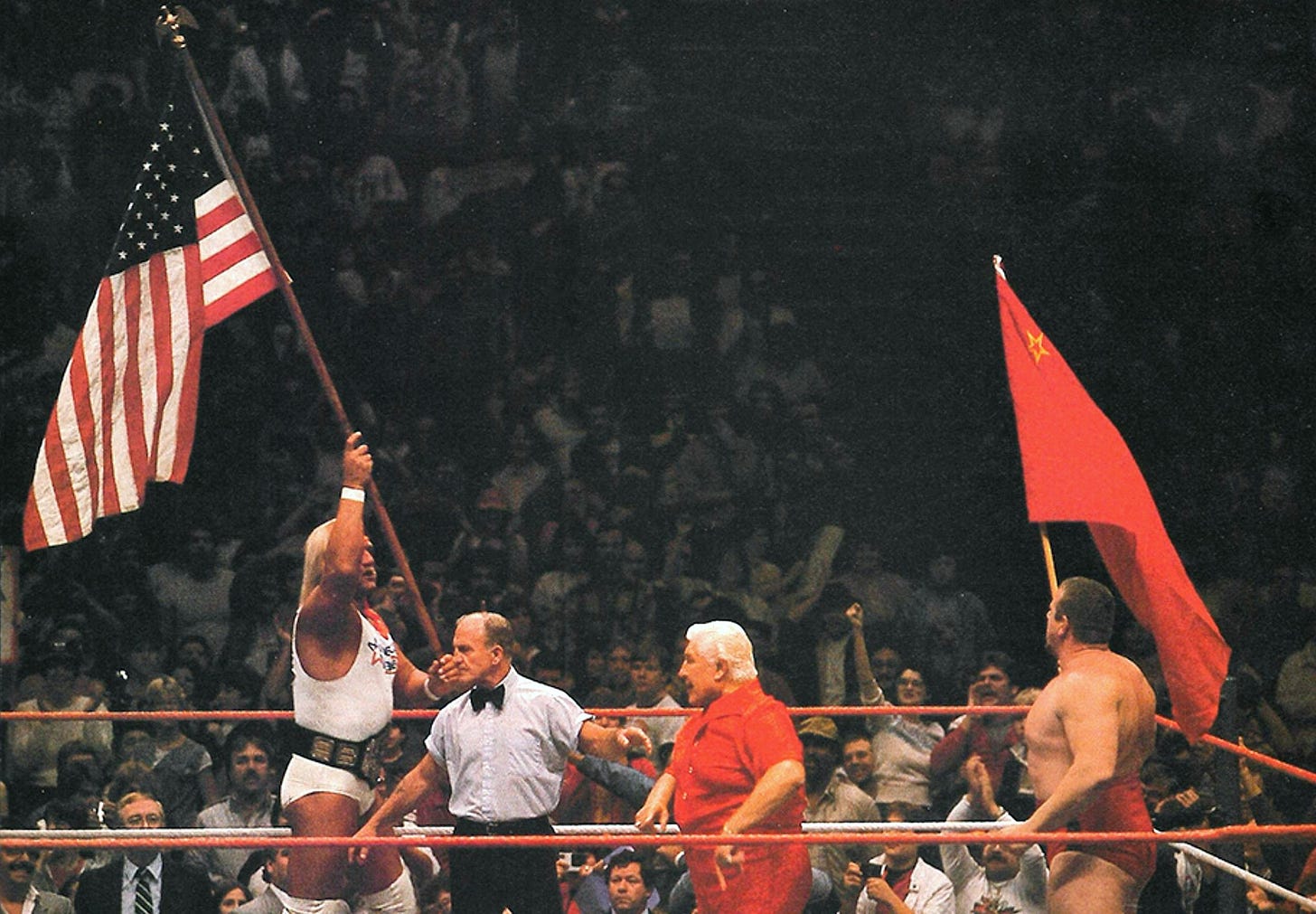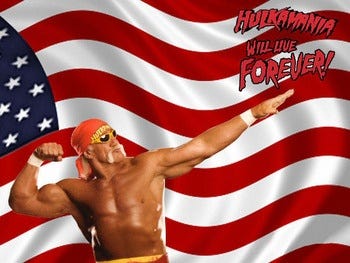Hulk Hogan: Cold Warrior
Remembering a Real American.
It has been an especially rough week for celebrity deaths, counting Malcolm Jamal Warner of Cosby Show fame, jazz legend Chuck Mangione, rock superstar Ozzy Osbourne[1], and perhaps the most famous professional wrestler of all time, Hulk Hogan. Born Terry Bollea in 1953, Hogan became the face of the World Wrestling Federation (WWF) and fundamentally altered the American sports and entertainment landscape forever. His crossover appeal and superstardom made him a household name, coming out of an attraction that was widely considered niche when he made his debut in 1977. Hogan was a genuine cultural phenomenon. His face was on everything from cereal and toys to clothing and kitchen products. He fought Rocky, played Santa Claus, and appeared on reality TV. He helped pioneer the idea of sports entertainment, combining in-ring flair with excellent mic skills. There were always better technical wrestlers (Bret Hart comes to mind), but nobody of his era came remotely close to Hulk Hogan in pure showmanship and entertainment value. From the mid-1980s through the 1990s, he was nearly ubiquitous. Hulkamania was indeed running wild, brother.
Without Hogan, wrestling would have remained a regional sideshow instead of transforming into a global phenomenon, all while retaining its profoundly American nature. Professional wrestling is the perfect American pastime. It engages young and old, male and female. It doesn’t take itself too seriously. It includes feats of daring, genuine athleticism, humor, and drama. It appeals to the masses – the common man that has always been at the heart of American culture. Its storylines range from the absurd to the grounded, but always reflect society at large. It promotes American ideals: strength, individual talent, charisma, and, often, patriotism. And that, dear reader, is where Hulk Hogan shined brightest.
His character was as all-American as it gets, from his entrance theme to his memorabilia. He wrapped himself in the flag every chance he got – and there were plenty of chances. Hulk Hogan was the avatar of America within pro wrestling, often being tasked with fighting the representations of our national enemies. He battled a whole stable of anti-American characters, including the Iron Sheik, Nikolai Volkoff, Boris Zhukov, and a villainous version of Sergeant Slaughter who turned against the US during the Gulf War. (Isn’t wrestling great?) Americana was his persona. And he became the most dominant champion of the entire period in which he wrestled under that identity. Most of all, Hogan represented a new era of American cultural confidence after the doldrums of the 1970s, without which we would not have defeated the Soviet Union and won the Cold War.
No, I’m not arguing that Hulk Hogan beat communism and brought down the Berlin Wall. But his success combined with his ultra-patriotic character was a microcosm of the cultural attitude that did both. The 1970s were a decade of, in Jimmy Carter’s words, malaise. America was on the back foot after the debacle in Vietnam, dealing with economic stagnation and rapid inflation, and looking for détente with the Soviets, not confrontation. We were handling the aftermath of Watergate and the only presidential resignation in history, a great deal of political violence and criminality, and social tensions rending the fabric of American culture. We were licking our wounds and slowly falling into decline. But the 1980s saw a total reversal of this slide into complacency.
Ronald Reagan was elected on a platform of change, using his movie star talents to bring back the classic American bravado and promising to turn around our domestic problems. The economy picked up, we quelled inflation, and slowed the seemingly inexorable rise of the federal government in everyday life. Abroad, we got our hostages back from Iran, bolstered our alliances with friendly powers, confronted the Soviets directly, and built America into a fearsome military force once again. We won a massive upset victory over the USSR’s hockey team at the Olympics in Lake Placid in 1980. Hollywood blockbusters saw Rocky knock out Ivan Drago, a scrappy bunch of Colorado teenagers turn back a Soviet invasion, and a group of American fighter aces smoke their Russian counterparts. And the world of wrestling was dominated by the hyper-American Hulk Hogan. The rediscovery of our patriotic self-confidence during the 1980s was a seismic cultural shift that was necessary to winning the Cold War.
Now, in the 21st century, we face perhaps an even grander threat to our way of life than we did 40 years ago. Our enemies – China, Russia, and Iran – are on the march. They are belligerent, dangerous, and dedicated to overthrowing the US-led world order. They interfere in American society through propaganda, cyber warfare, and even more nefarious criminal acts. All the while, we have retreated from our assertive international role, oft lamenting intervention as either misguided, wrongheaded, or evil. At the same time, our internal situation is chaotic and fractious. We are still recovering as a society from the global pandemic of just 5 years ago. (Thanks, China!) Our economy is perceived as failing a large number of Americans, our politics is hyperpolarized and partisan, criminality seems to run rampant in urban areas, political violence and scandal are commonplace, and the social fabric of the nation has been torn asunder. Significant portions of the populace are unhappy with their lot. Many on the left think this country is bad because of our past, while some on the right think this country is bad because of our present. Patriotism has declined among American elites and youth on both sides of the aisle.
America’s 1970s problems are her 2020s problems. But the solutions can be found in our past, too.
We must, as in the 1980s, reassert our cultural identity, embrace our shared patriotism, and rediscover our (correct) societal belief that America is the greatest force for good in the long history of mankind. We need to get our mojo back. The self-confidence that won us the Cold War is still latent inside the American body politic. We simply need to access it and use it. Hulk Hogan showed us the way the last time. Who will fill his bright red wrestling boots now?
[1] For more on Ozzy, listen to Episode 3 of the Rational Policy Podcast.



